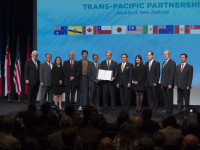Nearly two-and-a-half months ago, I started a daily examination of the Trans Pacific Partnership focused on the intellectual property and digital policy issues raised by the agreement. My initial plan for the Trouble with the TPP series was to write for one month leading up to the planned signing in New Zealand on February 4th. However, the more I dug into the TPP, the more trouble I found. With this final post in the series, I wrap up the key IP and digital policy concerns with links to all the original posts.
Canadians interested in the TPP now have an opportunity to have their voices heard. The Standing Committee on International Trade has been conducting hearings on the agreement for several weeks and has announced plans for cross-country consultations. Canadians can provide written submissions by April 30th. Alternatively, they can ask the committee to appear as a witness. Details on the committee opportunities can be found here. In addition, Canadians can send their comments directly to Global Affairs Canada, which is managing the government’s consultation. The email address is TPP-PTP.Consultations@international.gc.ca.
Why should Canadians speak out on the TPP? The former co-CEO of Research in Motion Jim Balsillie, Shopify CEO Tobi Lutke, Ford Canada CEO Dianne Craig, the Sierra Club, Doctors Without Borders, Canadian library groups, innovation expert Dan Breznitz, former deputy chief economist at Global Affairs Canada Dan Ciuriak, Canadian publisher Don LePan of Broadview Press, political science professor Blayne Haggart, investment dispute settlement expert professor Gus Van Harten, my colleague Professor Jeremy de Beer, and the Canadian Labour Congress are among those that have voiced concern with the agreement. My assessment of the IP and digital issues in the Trouble with the TPP series identified at least 49 reasons:
Read more ›



![Pete Souza [Public domain], via Wikimedia Commons](https://www.michaelgeist.ca/wp-content/uploads/2016/03/Barack_Obama__Stephen_Harper_give_press_conference_2-19-09-200x150.jpg)







